 Photographers looking for a simple and effective way to quickly frame shots might like to swivel their snapping eyes in the direction of the Ikodot.
Photographers looking for a simple and effective way to quickly frame shots might like to swivel their snapping eyes in the direction of the Ikodot.
An unusual and rather innovative thing, the Ikodot is best described as a ‘sports finder’ and is used for framing pictures without the need to look through a LCD display or peer through a small optical viewfinder.
A bit like a gun sight in use, the finder slots into a regular camera hotshoe and takes the form of a rectangular metal outline with two small raised metal balls in the middle.
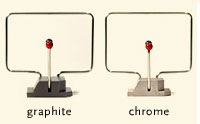 The user lines up the two balls to frame a photograph, with the lens coverage dictated by how close the finder is to your face.
The user lines up the two balls to frame a photograph, with the lens coverage dictated by how close the finder is to your face.
So for 21mm wideangle coverage, the user must hold the camera so that it ‘touches their cheek,’ while holding the camera so it’s touching the ‘average’ hooter will give 35mm coverage. For 50mm coverage, the camera must be held a thumbs-width from your nose.
Of course, this process is going to need some fine tuning and practice before it gets anywhere near as close as using a LCD screen, but it does have the advantage of being fast and discrete: photographers trying to sneak some snaps at a theatre, for example, will appreciate not having to illuminate the hall with each shot.
 The Ikodot also offers advantages for four-eyed photographers who perhaps find it hard to focus on a LCD screen or get close up to an optical viewfinder. It’s a shame that the finder can’t fold flat when not in use though.
The Ikodot also offers advantages for four-eyed photographers who perhaps find it hard to focus on a LCD screen or get close up to an optical viewfinder. It’s a shame that the finder can’t fold flat when not in use though.
The Ikodot is available in graphite and chrome finishes from www.ikodot.com for $99.
Read some photographers discussing the Ikodot here: DPReview
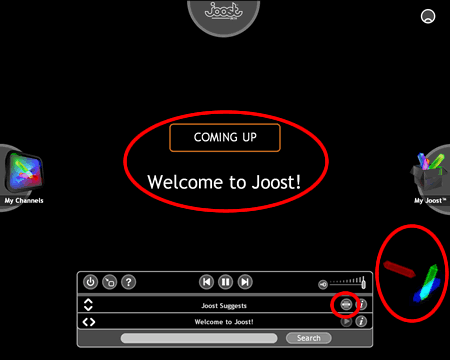
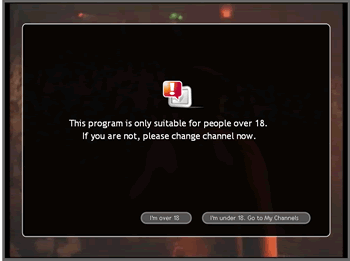 Those of you who have been watching the development of Joost, will notice that the adverts are getting just a little bit longer and more corporate. The latest addition appears to be an advert for IBM notebooks, while it is visually interesting (for the first viewing), it’s hardly cutting edge funk-ville.
Those of you who have been watching the development of Joost, will notice that the adverts are getting just a little bit longer and more corporate. The latest addition appears to be an advert for IBM notebooks, while it is visually interesting (for the first viewing), it’s hardly cutting edge funk-ville.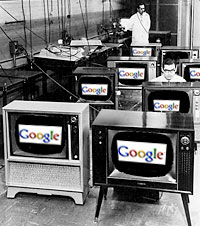 The company is set to unveil deals today with satellite TV service EchoStar Communications and Astound Cable in the US to broker commercials in a similar way to how it offers online advertising.
The company is set to unveil deals today with satellite TV service EchoStar Communications and Astound Cable in the US to broker commercials in a similar way to how it offers online advertising. During the television pilot, Google will serve commercials to EchoStar’s Dish Network satellite channels, a US service which enjoys around 13.1 million subscribers. The adverts won’t look any different to regular ones, carrying no Google branding and appearing in the usual time slots.
During the television pilot, Google will serve commercials to EchoStar’s Dish Network satellite channels, a US service which enjoys around 13.1 million subscribers. The adverts won’t look any different to regular ones, carrying no Google branding and appearing in the usual time slots.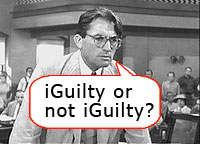 The EU alleges that agreements between Apple and the record companies are guilty of breaking European Union rules that prohibit restrictive business practices. It’s far from the first time that the EU and other
The EU alleges that agreements between Apple and the record companies are guilty of breaking European Union rules that prohibit restrictive business practices. It’s far from the first time that the EU and other  “The statement of objections alleges that distribution agreements between Apple and major record companies contain territorial sales restrictions,” he added.
“The statement of objections alleges that distribution agreements between Apple and major record companies contain territorial sales restrictions,” he added. Apple and the record companies now have two months to defend themselves in writing or take part in an oral hearing which usually happens around a month after a written reply has been received.
Apple and the record companies now have two months to defend themselves in writing or take part in an oral hearing which usually happens around a month after a written reply has been received. The report found that half of all UK adults live in broadband-connected households, up 11% from 12 months ago and a hefty seven times increase from 2002.
The report found that half of all UK adults live in broadband-connected households, up 11% from 12 months ago and a hefty seven times increase from 2002. Although just under half of users had no idea how fast they were connecting to the Internet, the report put the average headline connection speed at 3.8Mbps (up from 1.6Mbps in 2005).
Although just under half of users had no idea how fast they were connecting to the Internet, the report put the average headline connection speed at 3.8Mbps (up from 1.6Mbps in 2005). 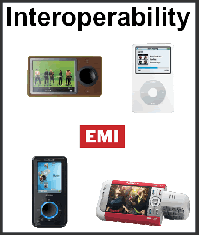 It wasn’t the
It wasn’t the 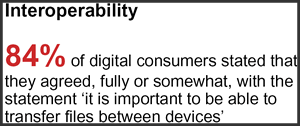 “We are going to give iTunes customers a choice — the current versions of our songs for the same 99 cent price, or new DRM-free versions of the same songs with even higher audio quality and the security of interoperability for just 30 cents more,” said Steve Jobs, Apple’s CEO.
“We are going to give iTunes customers a choice — the current versions of our songs for the same 99 cent price, or new DRM-free versions of the same songs with even higher audio quality and the security of interoperability for just 30 cents more,” said Steve Jobs, Apple’s CEO. 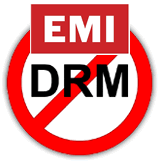 Keen not to miss out on the quote-fest, Eric Nicoli, CEO of EMI Group, piped up: “EMI and iTunes are once again teaming up to move the digital music industry forward by giving music fans higher quality audio that is virtually indistinguishable from the original recordings, with no usage restrictions on the music they love from their favourite artists.”
Keen not to miss out on the quote-fest, Eric Nicoli, CEO of EMI Group, piped up: “EMI and iTunes are once again teaming up to move the digital music industry forward by giving music fans higher quality audio that is virtually indistinguishable from the original recordings, with no usage restrictions on the music they love from their favourite artists.” If you travel around the UK a lot and find the homogenisation of High Streets into identical rows of bland coffeeshop multinationals a deeply depressing experience, you may find
If you travel around the UK a lot and find the homogenisation of High Streets into identical rows of bland coffeeshop multinationals a deeply depressing experience, you may find  Delocating the world
Delocating the world With Starbucks promising to open a new branch
With Starbucks promising to open a new branch 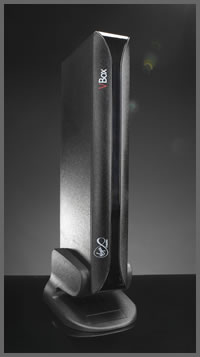 Virgin Media has ramped up the availability of its quadplay (broadband, phone, mobile and TV) services beyond its cable franchise network with today’s announcement of a new digital TV service.
Virgin Media has ramped up the availability of its quadplay (broadband, phone, mobile and TV) services beyond its cable franchise network with today’s announcement of a new digital TV service.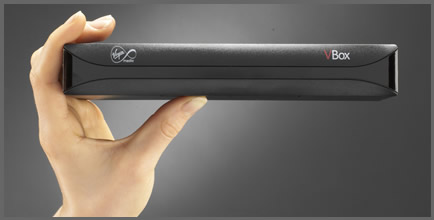
 Yesterday, record company giants EMI Group PLC announced that it planned to unveil “an exciting new digital offering” with Steve Jobs and the gang at Apple, leading pundits to conclude that The Beatles’ music catalogue is finally about to be made available through Apple’s iTunes online music store.
Yesterday, record company giants EMI Group PLC announced that it planned to unveil “an exciting new digital offering” with Steve Jobs and the gang at Apple, leading pundits to conclude that The Beatles’ music catalogue is finally about to be made available through Apple’s iTunes online music store. The Beatles have famously refused to sign up to iTunes and other online music services for years, and many expect the download charts to be instantly filled up with the Fab Four’s songs as soon as their catalogue becomes available.
The Beatles have famously refused to sign up to iTunes and other online music services for years, and many expect the download charts to be instantly filled up with the Fab Four’s songs as soon as their catalogue becomes available.